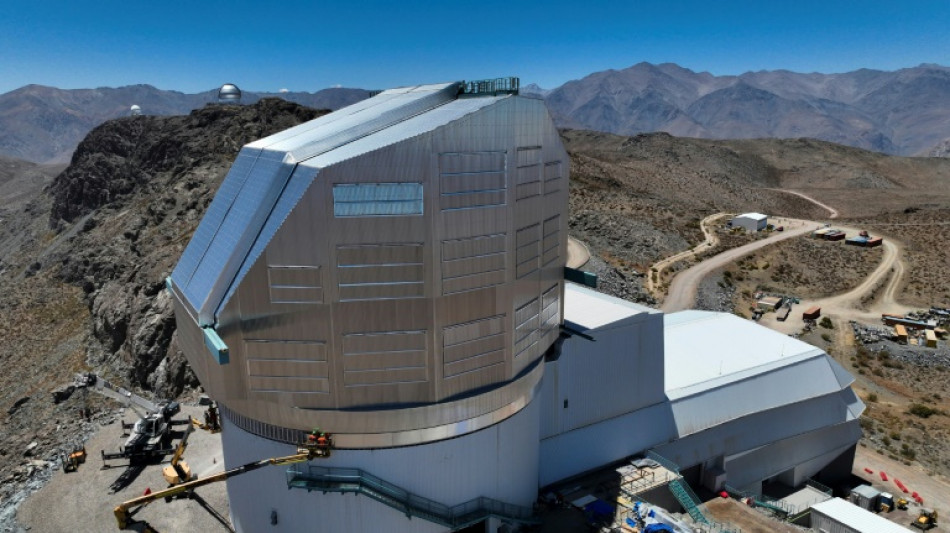
-
 LeBron back in training, edges closer to Lakers return
LeBron back in training, edges closer to Lakers return
-
Climate talks run into night as COP30 hosts seek breakthrough

-
 Germany and Netherlands lock up World Cup spots in style
Germany and Netherlands lock up World Cup spots in style
-
Germany's Woltemade hopes for 2026 World Cup spot after scoring again

-
 Germany 'send message' with Slovakia rout to reach 2026 World Cup
Germany 'send message' with Slovakia rout to reach 2026 World Cup
-
Trump unveils fast-track visas for World Cup ticket holders

-
 Netherlands qualify for World Cup, Poland in play-offs
Netherlands qualify for World Cup, Poland in play-offs
-
Germany crush Slovakia to qualify for 2026 World Cup

-
 Stocks gloomy on earnings and tech jitters, US rate worries
Stocks gloomy on earnings and tech jitters, US rate worries
-
'In it to win it': Australia doubles down on climate hosting bid

-
 Former NFL star Brown could face 30 yrs jail for shooting case: prosecutor
Former NFL star Brown could face 30 yrs jail for shooting case: prosecutor
-
Fate of Canada government hinges on tight budget vote

-
 New research measures how much plastic is lethal for marine life
New research measures how much plastic is lethal for marine life
-
Mbappe, PSG face off in multi-million lawsuit

-
 EU defends carbon tax as ministers take over COP30 negotiations
EU defends carbon tax as ministers take over COP30 negotiations
-
McCartney to release silent AI protest song

-
 Stocks tepid on uncertainty over earnings, tech rally, US rates
Stocks tepid on uncertainty over earnings, tech rally, US rates
-
Louvre shuts gallery over ceiling safety fears

-
 'Stranded, stressed' giraffes in Kenya relocated as habitats encroached
'Stranded, stressed' giraffes in Kenya relocated as habitats encroached
-
US Supreme Court to hear migrant asylum claim case

-
 Western aid cuts could cause 22.6 million deaths, researchers say
Western aid cuts could cause 22.6 million deaths, researchers say
-
Clarke hails Scotland 'legends' ahead of crunch World Cup qualifier

-
 S.Africa says 'suspicious' flights from Israel show 'agenda to cleanse Palestinians'
S.Africa says 'suspicious' flights from Israel show 'agenda to cleanse Palestinians'
-
South Korea pledges to phase out coal plants at COP30

-
 Ex-PSG footballer Hamraoui claims 3.5m euros damages against club
Ex-PSG footballer Hamraoui claims 3.5m euros damages against club
-
Mbappe, PSG in counterclaims worth hundreds of millions

-
 Two newly discovered Bach organ works unveiled in Germany
Two newly discovered Bach organ works unveiled in Germany
-
Stocks lower on uncertainty over earnings, tech rally, US rates

-
 Barca to make long-awaited Camp Nou return on November 22
Barca to make long-awaited Camp Nou return on November 22
-
COP30 talks enter homestretch with UN warning against 'stonewalling'

-
 France makes 'historic' accord to sell Ukraine 100 warplanes
France makes 'historic' accord to sell Ukraine 100 warplanes
-
Delhi car bombing accused appears in Indian court, another suspect held

-
 Emirates orders 65 more Boeing 777X planes despite delays
Emirates orders 65 more Boeing 777X planes despite delays
-
Ex-champion Joshua to fight YouTube star Jake Paul

-
 Bangladesh court sentences ex-PM to be hanged for crimes against humanity
Bangladesh court sentences ex-PM to be hanged for crimes against humanity
-
Trade tensions force EU to cut 2026 eurozone growth forecast

-
 'Killed without knowing why': Sudanese exiles relive Darfur's past
'Killed without knowing why': Sudanese exiles relive Darfur's past
-
Stocks lower on uncertainty over tech rally, US rates

-
 Death toll from Indonesia landslides rises to 18
Death toll from Indonesia landslides rises to 18
-
Macron, Zelensky sign accord for Ukraine to buy French fighter jets

-
 India Delhi car bomb accused appears in court
India Delhi car bomb accused appears in court
-
Bangladesh ex-PM sentenced to be hanged for crimes against humanity

-
 Leftist, far-right candidates advance to Chilean presidential run-off
Leftist, far-right candidates advance to Chilean presidential run-off
-
Bangladesh's Hasina: from PM to crimes against humanity convict

-
 Rugby chiefs unveil 'watershed' Nations Championship
Rugby chiefs unveil 'watershed' Nations Championship
-
EU predicts less eurozone 2026 growth due to trade tensions

-
 Swiss growth suffered from US tariffs in Q3: data
Swiss growth suffered from US tariffs in Q3: data
-
Bangladesh ex-PM sentenced to death for crimes against humanity

-
 Singapore jails 'attention seeking' Australian over Ariana Grande incident
Singapore jails 'attention seeking' Australian over Ariana Grande incident
-
Tom Cruise receives honorary Oscar for illustrious career


Astronomers in Chile to scour universe with car-sized mega camera
Surrounded by the desert mountains and clear blue sky of northern Chile, astronomers from the Vera C. Rubin Observatory hope to revolutionize the study of the universe by affixing the world's largest-ever digital camera to a telescope.
The size of a small car and weighing 2.8 metric tons, the sophisticated piece of equipment will reveal views of the cosmos as never before, officials from the US-funded project told AFP.
Beginning in early 2025, when the $800 million camera will snap its first photos, the machine will sweep the sky every three days, allowing scientists to reach new heights in their galactic analyses.
Researchers will be able to go from "studying one star and knowing everything in-depth about that one star, to studying thousands of stars at a time," said Bruno Dias, president of the Chilean Society of Astronomy (Sochias).
According to Stuartt Corder, deputy director of NOIRLab, the US research center running the observatory located 2,500 meters (8,200 feet) up the Cerro Pachon mountain, 560 kilometers (350 miles) north of Santiago, the new facility will usher in "a paradigm shift in astronomy."
The project solidifies Chile's dominant position in astronomical observation, as the South American country is home to a third of the globe's most powerful telescopes, according to Sochias, and boasts among the clearest skies on the planet.
The Rubin Observatory camera's first task will be to complete a 10-year review of the sky, called the Legacy Survey of Space and Time (LSST), which researchers hope will reveal information about 20 million galaxies, 17 billion stars and six million space objects.
The survey will give scientists an up-to-date inventory of images of the solar system, allow them to map our own galaxy, the Milky Way, and delve deeper into the study of energy and dark matter.
- 300 TVs for one picture -
The new camera will be able to capture 3,200-megapixel photos -- resulting in images so large they would require more than 300 average-size high-definition televisions, lined up together, to view just one.
The machine, built in California, will have triple the capacity of the world's current most powerful camera, the 870-megapixel Hyper Suprime-Cam in Japan, and will have six times the capacity of NOIRLab's most powerful camera.
The lab's existing top camera, on Chile's Cerro Tololo mountain, is only 520 megapixels, according to Jacques Sebag, head of construction of the Rubin telescope.
Chile's telescopes have come a long way since the 40-centimeter Cerro Tololo telescope, at the country's first international observatory, installed in the 1960s.
"That telescope arrived here on the back of a mule, because there was no road," said Stephen Heathcote, director of the Cerro Tololo Inter-American Observatory, only 20 kilometers from Cerro Pachon.
- Astronomy capital of the world -
The Vera C. Rubin Observatory, named in honor of the US astronomer who discovered dark matter, will join several other space observation research centers in northern Chile.
The natural conditions of the region's desert landscape -- tucked between the Pacific Ocean and the Andes mountain range -- creates the clearest skies on the planet, thanks to a dry climate with little cloud cover.
The area plays host to telescopes from more than 30 countries, including some of the most powerful astronomical instruments in the world, such as the radio telescope at the ALMA Observatory and the under-construction Extremely Large Telescope, which by 2027 is set to be able to view never-before-seen reaches of the universe.
Many of humanity's most important astronomical discoveries have been made at the Cerro Tololo observatory, such as the 2011 Nobel Prize-winning revelation that expansion of the universe is picking up speed, a phenomenon known as cosmic acceleration.
Though other influential observatories have been opened around the globe, including in the United States, Australia, China and Spain, "Chile is unbeatable" in the world of astronomy, said Dias, the Sochias president.
R.AbuNasser--SF-PST




